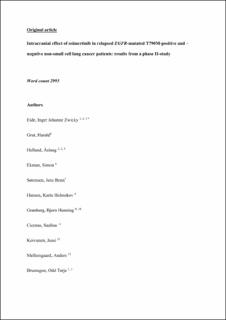| dc.description.abstract | Introduction Osimertinib is effective for relapsed T790M-positive patients with brain metastases. The high brain permeability suggests that also such patients without T790M could benefit. Therefore, we evaluated the effect of osimertinib on brain metastases in both T790M-positive and -negative patients. Methods The TREM-study was an investigator-initiated phase II, single-arm, multi-institutional clinical trial conducted in Northern Europe. Patients with resistance to prior EGFR-TKIs received osimertinib until radiological progression, unacceptable toxicity or death. Baseline brain scans were performed in patients with known or suspected brain metastases and repeated every 8–12 weeks. We assessed intracranial efficacy in patients with baseline brain metastases. Results Brain metastases were detected in 48/199 patients at baseline. Of these, 63% were T790M-positive, 27% -negative and 10% had unknown T790M-status. The majority (73%) of the patients had received prior whole brain radiotherapy and additionally 8% had received stereotactic radiosurgery (SRS). Brain scans were available for review for 42 patients. The intracranial progression free survival was 39.7 versus 3.5 months for T790M + and T790M- patients, respectively (p < 0.001). The overall intracranial disease control rate (iDCR) was 81%, and for T790M + and T790M- patients the DCR was 89% versus 55%, respectively. The estimated risk of CNS progression was 0.8% at 6 months and 6% at 12 months for T790M-positive patients, and 14% and 17% at 6 and 12 months, respectively, for the T790M-negative. Conclusion This subgroup analysis confirms CNS efficacy of osimertinib in patients with the T790M resistance mutation, while other treatment options should be considered for EGFR-TKI relapsed T790M-negative patients with brain metastases. | en_US |
